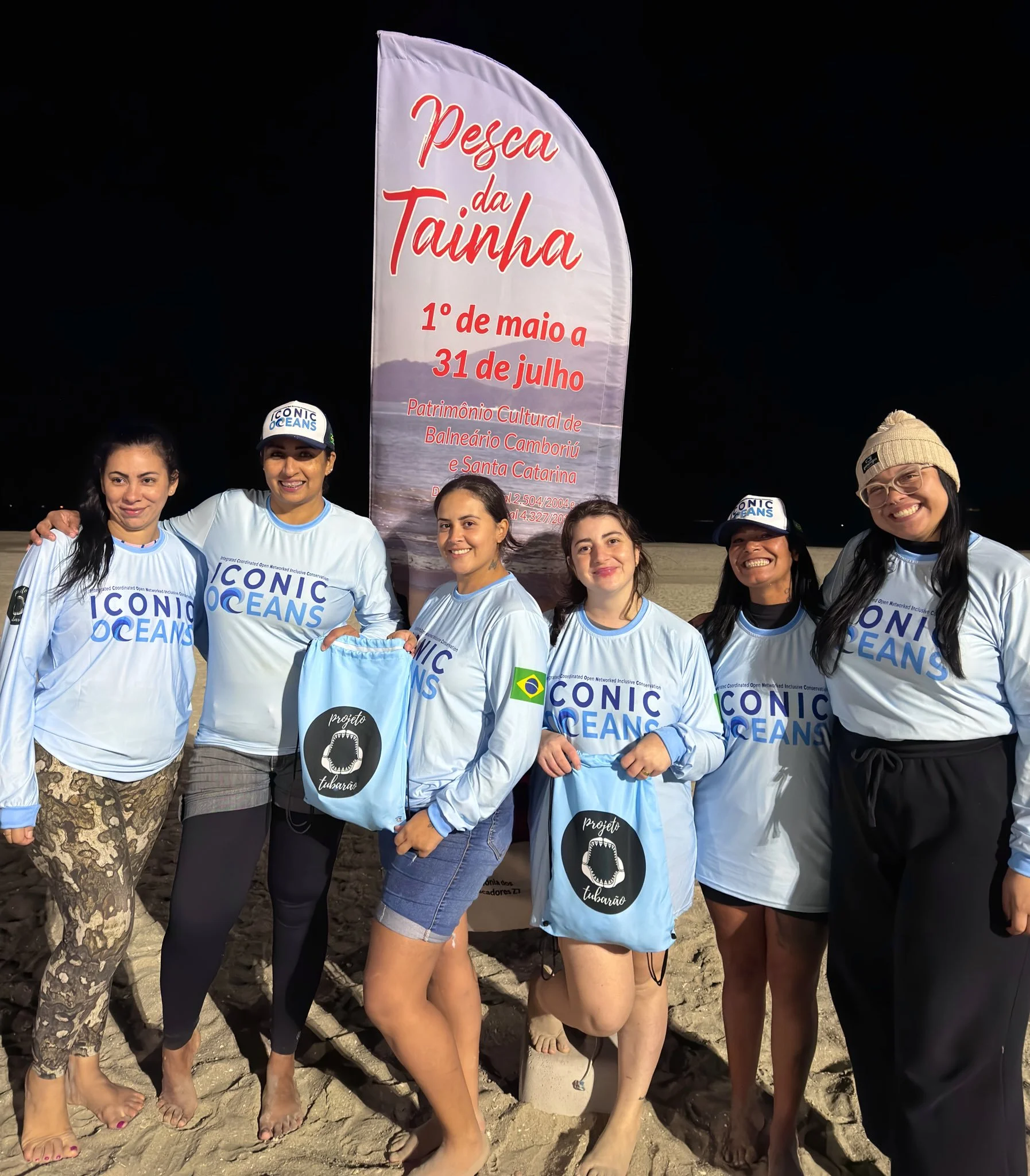Exploring ICONIC Oceans: Redefining Marine Research for Inclusive Conservation
By Safina Center Fellow Jasmin Graham
Field Research Lead, Ingrid Hyrycena dos Santos, with some of the women fishers she works with in Brazil in collaboration between Projeto Tubarão and MISS as part of the ICONIC Oceans program. ©Ingrid Hyrycena dos Santos.
In the realm of marine science, particularly in elasmobranch ecology, a significant problem persists: the unequal distribution of funding, resources, and infrastructural support. This disparity often hinders researchers from underfunded institutions, especially those from underrepresented backgrounds, from engaging in groundbreaking research. These scientists frequently find themselves relegated to less impactful roles, facing discrimination, and struggling with inadequate compensation and recognition. This situation is exacerbated by the high costs associated with data collection and analysis in marine research.
Enter ICONIC Oceans—an ambitious initiative designed to address these challenges head-on through Integrated, Coordinated, Open, Networked, Inclusive Conservation of our Oceans. ICONIC Oceans aims to transform the landscape of marine research by fostering a diverse and equitable scientific community while making resources more accessible to a broader range of researchers.
The Need for ICONIC Oceans
Marine science and conservation have long struggled with a lack of diversity, a gap that starkly contrasts with the diverse populations residing along coastlines. This disconnect not only results in less effective and less inclusive research, but also breeds mistrust between scientists, policy makers, and the communities they aim to serve. ICONIC Oceans seeks to bridge this gap by integrating scientists and stakeholders from marginalized communities into the conservation dialogue. By doing so, it aims to uncover valuable insights that can only be gathered through collaborative efforts with coastal and indigenous communities.
Key Objectives and Strategies
Providing Infrastructural Support: ICONIC Oceans focuses on offering the necessary infrastructure for multidisciplinary and multi-institutional research projects led by BIPOC scientists. This support includes financial support for data collection and storage at field sites, thus reducing barriers to entry for underrepresented researchers.
Developing Equitable Collaboration Models: The initiative is committed to refining a model for equitable research collaborations. This involves decentralizing power and resources from large institutions and making them available to a more diverse scientific workforce. By fostering a more inclusive environment, ICONIC Oceans aims to ensure that all contributors are credited and compensated fairly.
Building an Open-Access Platform: ICONIC Oceans will establish an online platform that facilitates the open exchange of information and resources. This platform will feature a sample library, a resource library, open-source data, and a request portal to streamline access to vital research materials.
Annual Summits: These gatherings will include mandatory training in Equity, Diversity, and Inclusion (EDI) and inclusive research practices. Participants will collaborate on creating a collective agreement and system of accountability, as well as developing scientific questions and forming working groups to address five critical ecological questions related to elasmobranchs.
Current Projects
ICONIC Oceans is already making strides with several ongoing projects:
Bonnethead Ampullae of Lorenzini Density: Led by Dr. Lauren Simonitis, this project explores the sensory biology of bonnethead sharks with a team of dedicated mentees.
Behavioral and Fluid Interactions Among Schooling Elasmobranchs: Under Dr. Brooke Flemming’s mentorship, this project examines the complex behaviors and interactions of schooling and migrating elasmobranchs.
Characterization of Data Deficient Fisheries: This project focuses on improving our understanding of fisheries with limited data. Ingrid Hyrycena dos Santos, Lara Fola-Matthews, Meghana Binraj, and Buddhi Maheshika are all Field Research Leads on this project collecting data in their home countries of Brazil, Nigeria, India and Sri Lanka, respectively. This data will be used to explore population genetics under the mentorship of Dr. Toby Daly-Engel and trophic ecology under the mentorship of Dr. Sora Kim.
The ICON Framework
ICONIC Oceans is built on the ICON framework, which stands for Integrated, Coordinated, Open, Networked. This framework emphasizes:
Integration of various scientific disciplines and local knowledge.
Coordination of consistent research protocols.
Openness in data sharing and resource accessibility.
Networking to create mutually beneficial research and resource sharing.
By adopting this framework, ICONIC Oceans aims to create a more inclusive, collaborative, and effective approach to marine conservation, ensuring that every voice in the scientific community has the opportunity to contribute to the protection and sustainable use of our oceans.

